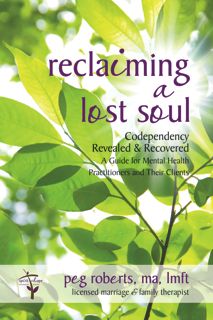What does it mean to lose your soul?
- Disconnection from God:

- (Feeling lost and uncertain where God has gone, charting your own life’s path, but feeling lost and alone)
- Challenging Emotions:
- (Exhaustion, overwhelmed, powerless, hopeless, frustrated, angry, contemptuous, disconnected from God)
- Challenging Thoughts:
- (I’m to blame, I’m not worthy, No one is there for me, I shouldn’t say “No” to anyone, I’m powerless)
- Challenging Behaviors:
- (Addiction, controlling others, perfectionism, manipulation, passive-aggressive, lack of healthy boundaries)
Read More . . .
Are you ready to reclaim your life today and live as you believe God intended? This faith-based workbook offers you an in-depth understanding of codependency or “losing one’s soul,” identifying what it looks like, how it develops, and how to heal. Along with prayer and journaling exercises, it allows you to dig deeper, looking inside yourself and meditating on God.
It’s perfect for group settings to work through one chapter at a time. Or have your therapist walk through the book with you!
Click on “Buy Now” to get your Workbook Today
Here’s What One Soul Seeker Has To Say:
Peg’s understanding of the Lost Soul is evident in her workbook. One feels she is personally accompanying the reader on the healing journey. Her wisdom, experience, and examples are practical and applicable to anyone seeking freedom. Reclaiming Your Lost Soul is a great resource, providing a reliable road to recovery and healing!
Take the Assessment and See For Yourself
Have you Lost Your Soul?
If you see yourself as a lost soul, this is the workbook for you! (Assessment here) Losing your soul, (also known as codependency), has a consistent set of thoughts, feelings, behaviors, and spiritual components that start early in childhood. Your early responses to life can be impacted by the healthiness of your family. Difficulties flourish in families with addiction, chronic mental health issues, chronic illnesses, and other situations where children grow up too fast.
Where there has been abuse, heartbreak and/or neglect the environment becomes a breeding ground for unhealthy coping strategies. Children learn to care for the adults rather than be cared for by their caregivers. Children’s emotions are unregulated and poorly managed in childhood and eventually become problematic in their adult relationships. When kids learn these poor strategies to manage their emotions, reactions, and lives, their relationships can be immature and highly unhealthy.